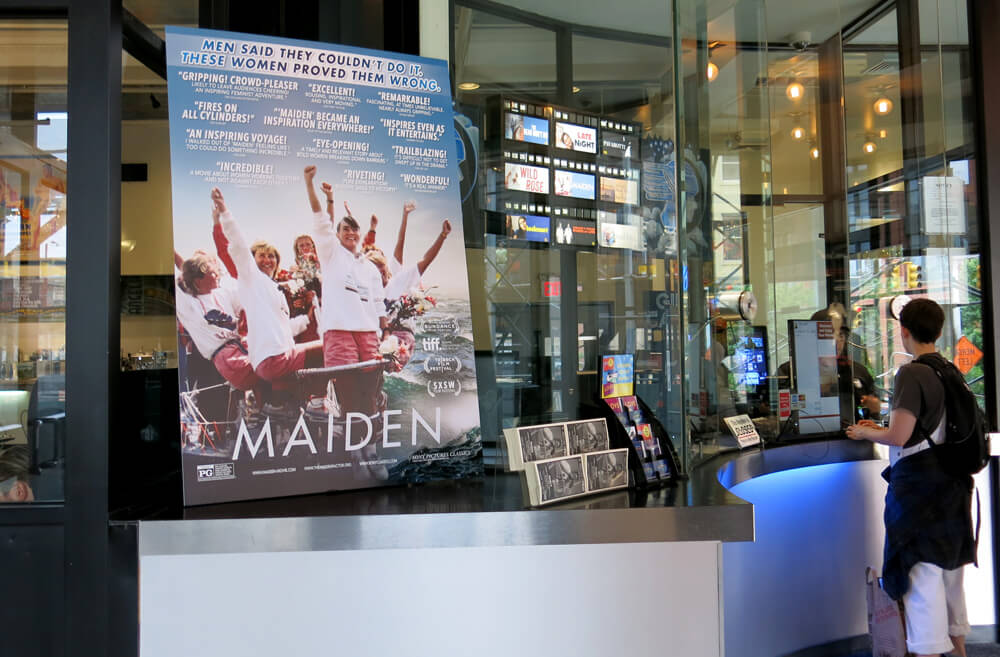
Note: Some spoilers ahead.
Investors sneered at them, journalists sexified them, and their male competitors insulted them. Nevertheless, as depicted in the new documentary Maiden, 26-year-old skipper Tracy Edwards and her 12-women crew persisted.
The year was 1989 — which doesn’t seem that long ago — but in the world of sailing, a traditionally male sport, Edwards and her crew faced blatant discrimination and economic hurdles on their rocky and riveting voyage to success. The film, released June 28, profiles the woman with a dream that started it all and interweaves interview clips with terrifying footage of 50-foot waves. Despite the hazards, as Edwards has said: “I would say this to anyone thinking about doing anything, don’t think about it, do it.”
Maiden documents the crew as they compete in the Whitbread Round the World yacht race. In front of thousands of supporters, Edwards’ boat, which is named Maiden, wins the first two legs of the Whitbread and ends up finishing in second place. They are, however, first in the spectators’ hearts. It was the best result for a British boat in 17 years and still the best ever for an all-female crew.
[Related: This former boat captain started her own business and is living off the grid]
As the film depicts, it wasn’t uncommon for men and women to race together — but a female-run boat, at the time, was inconceivable. That motivates Edwards to take on the challenge. As she told Entrepreneur about her thought process: “[With men aboard], a woman sailing with me will never be recognized for her skill, her achievement. I thought the only way we’ll prove that women can do this is if we have an all-female crew.”
Edwards had gained valuable experience from previous sailing competitions. Leaving her home behind, Edwards started as a cook for a male-run boat in the 1985-1986 Whitbread. As one of four female sailors among 23 boats and 230 crew members, she had to fight for her right to be free — and to sail, which were synonymous to her.
“When I’m at sea, I don’t need to look or behave a certain way. I can just be out in the elements and feel like me,” Edwards told Vanity Fair.
Being yourself is easier said than done in a sporting event rife with sexism. To build the Maiden, Edwards started from scratch (literally) and renovated a dilapidated yacht into ship-shape condition. While she worked in a boatyard, she would get comments like “Do you want help with that, love?” Male journalists, too, had choice words for Edwards’ crew, who they called “a tin full of tarts.”
[Related: This woman tackles sexual harassment in the workplace with her new film]
For two years, Edwards struggled to raise the 1 million British pounds needed to compete in the Whitbread race — no one would invest in an all-female crew. In a chance event, though, King Hussein of Jordan, who took an interest in yachting, was “convinced” to help her. With the funds to back her dream and the wind in her sails, Edwards and her crew were ready to compete — and to dominate. “When women join together,” she told Vanity Fair, “we can do anything.” The rest is history.
After the Maiden’s victories, Edwards sold the ship in 1990 only to rescue it decades later: Edwards crowdfunded 5 million pounds to finance the ship’s restoration. Currently, the Maiden is sailing around the world to promote Edwards’ non-profit, The Maiden Factor, which supports girls’ education and gender equality.
Though Edwards isn’t on board this time around, she’s “happy to be warm and dry. I love running the Maiden Factor Foundation, and I’m happy to provide the vehicle for everyone else to sail her now.”
[Related: This executive talks about closing the gender gap in Hollywood]

